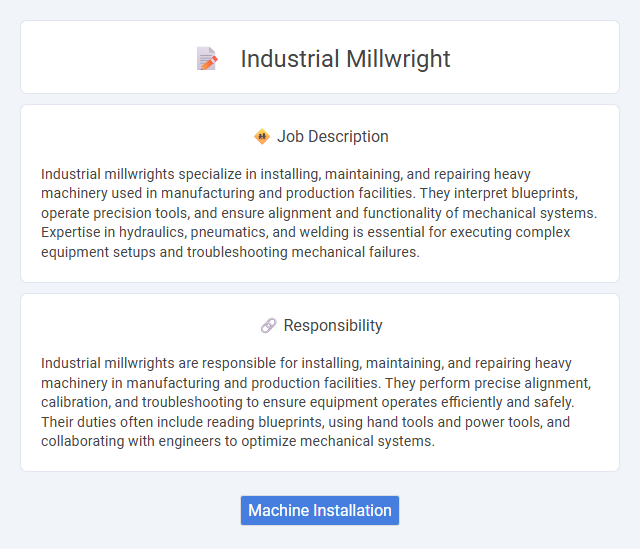
Industrial millwrights specialize in installing, maintaining, and repairing heavy machinery used in manufacturing and production facilities. They interpret blueprints, operate precision tools, and ensure alignment and functionality of mechanical systems. Expertise in hydraulics, pneumatics, and welding is essential for executing complex equipment setups and troubleshooting mechanical failures.
Industrial millwright jobs likely require individuals with strong mechanical skills, physical stamina, and the ability to work in demanding environments. People comfortable with hands-on tasks, troubleshooting machinery, and working in variable weather or confined spaces may find this role suitable. Those who struggle with physical labor or have difficulty focusing on precise technical details might be less compatible with the job's requirements.
Qualification
Industrial millwrights require a specialized combination of technical skills and formal education, typically including a high school diploma or equivalent, followed by completion of an apprenticeship program. Proficiency in reading blueprints, operating precision tools, and understanding mechanical systems is essential, along with strong problem-solving abilities. Certifications such as OSHA safety training or specialized equipment operation credentials enhance job prospects and ensure compliance with industry standards.
Responsibility
Industrial millwrights are responsible for installing, maintaining, and repairing heavy machinery in manufacturing and production facilities. They perform precise alignment, calibration, and troubleshooting to ensure equipment operates efficiently and safely. Their duties often include reading blueprints, using hand tools and power tools, and collaborating with engineers to optimize mechanical systems.
Benefit
Industrial millwright jobs likely offer benefits such as competitive salaries, comprehensive health insurance, and retirement plans due to the specialized skills required. There may be opportunities for overtime pay and bonuses in high-demand sectors, enhancing overall compensation. Job stability and career growth potential could also attract candidates looking for long-term employment in manufacturing or industrial settings.
Challenge
Industrial millwright jobs present significant challenges due to the complexity of assembling, maintaining, and repairing heavy machinery in various industrial settings. The probability of encountering unpredictable mechanical failures requires strong problem-solving skills and adaptability. Workers often face demanding physical tasks and high-pressure environments where precision and safety are crucial.
Career Advancement
Industrial millwrights specialize in installing, maintaining, and repairing heavy machinery crucial for manufacturing and production processes. Career advancement opportunities include progressing to supervisory roles, project management, or becoming specialized technicians in automation and robotics within industrial environments. Developing expertise in advanced mechanical systems, welding, and CNC machinery enhances job prospects and potential salary growth in this field.
Key Terms
Machine Installation
Industrial millwrights specialize in precise machine installation, ensuring equipment alignment and secure anchoring in manufacturing facilities. They interpret blueprints and technical specifications to assemble, install, and calibrate heavy machinery critical for production efficiency. Expertise in hydraulic, pneumatic, and electrical systems enables millwrights to optimize machine performance and minimize operational downtime.
 kuljobs.com
kuljobs.com